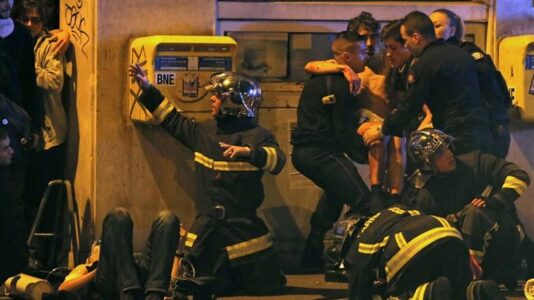
What happened the night Islamic State terrorists bombed the celebrated Paris music venue?
The only suicide bomber to survive the worst terrorist attack in the recent history of France will spend the rest of his life in prison, judges have ruled.
Salah Abdeslam, 32, has no hope of parole for his part in the atrocities in November 2015, in which 130 people were murdered.
Another 500 people were injured in the attacks carried out by Islamist militants on the Stade de France in Paris, at six restaurants and cafes along the 10th and 11th arrondissement and at the Bataclan concert hall.
France – and the rest of Europe – was left in a state of shock.
Five specialist anti-terrorist judges sitting in Paris announced on Wednesday that Abdeslam was guilty of various terrorist related charges, along with 18 other defendants.
It followed a marathon 10-month trial at a specially built court in the Palais de Justice in Paris, involving 1,800 plaintiffs, 330 lawyers and a case file stretching to a million pages across 542 volumes.
The American rock band Eagles of Death Metal were on stage at the Bataclan that night, and were an hour into their set, performing their song “Kiss the Devil” when three armed jihadists – Foued Mohamed-Aggad, Ismael Omar Mostefai and Samy Amimouburst – burst into the venue filled with 1,500 fans at around 9.47pm.
The attackers cried “Allahu Akbar” and started firing into the crowd with automatic rifles. The massacre lasted nearly two-and-a-half hours with the light from the killers’ guns as they fired being the only disruption to the darkness.
Ninety people lost their lives amid the melee as spectators scrambled for the exits during intervals in the shooting when the killers reloaded their weapons from cartridges carried in rucksacks.
Others died refusing to leave the side of wounded friends.
French special forces stormed the theatre at 12.12am, and the killers abandoned their plan to take hostages, instead detonating their suicide vests and dying in the blast.
Abdeslam survived because his suicide vest failed to explode.
Traumatised members of the band later told Vice that they initially assumed the loud banging and screams they had heard from the arena was the result of fans letting off firecrackers or a piece of their own equipment backfiring before realising something was gravely wrong and crawling from the stage in terror.
Frontman Jesse Hughes, guitarist Eden Galindo and drummer Julian Doria managed to escape into a sidestreet via a backstage door, eventually finding sanctuary inside a local police station with the help of bystanders.
As he fled, Hughes frantically called out for his girlfriend, Tuesday Cross, at which point he encountered one of the gunmen. “I saw the shooter. He turned and brought the gun down on me but the barrel hit the doorframe,” Hughes told Vice. In the interview recorded 12 days after the event he was still visibly shaken.
Bassist Matt McJunkins, meanwhile, hid with fans inside a dressing room, the group armed only with a champagne bottle intended for the after-party to defend itself, while another guitarist, Dave Catching, took cover in a bathroom before he was eventually rescued by police.
Like Hughes, Eagles of Death Metal sound engineer Shawn London also remembered locking eyes with one of the terrorists as he fled the auditorium via its smashed glass front doors: “He looked right at me. He shot at me and missed. It hit my console and buttons went flying everywhere,” he said.
The group’s merchandise vendor, Nick Alexander, 36, from Colchester, was among the dead.
Isis later admitted carrying out the coordinated attacks as retaliation against France for air strikes against its militia in Syria and Iraq.
The same network struck again in Brussels, Belgium, four months later, killing another 32 people.
Paris prosecutor Francois Molins, who was at the Bataclan that night and led the inquiry, said he – like Eagles of Death Metal frontman Jesse Hughes – still suffered regular nightmares as a result of the jihadists’ actions.
“The vision of the crime scenes will never leave my head,” he said. “After that, I take measure of the comfort zone in which I find myself. I did not suffer in my flesh. I did not lose people close to me.”
The hearing devoted time to allowing survivors to testify in detail about their ordeal and their struggles in overcoming it, while families of those killed spoke of how hard it was to move on.
They recounted deeply personal accounts of the horrors inflicted that night and listened to stories of countless acts of bravery, humanity and compassion among strangers. Some hoped for justice, but most just wanted tell the accused directly that they had been left irreparably scarred, but not broken.
“The assassins, these terrorists, thought they were firing into the crowd, into a mass of people,” said Dominique Kielemoes at the start of the trial in September. Her son bled to death in a cafe. “It wasn’t a mass — these were individuals who had a life, who loved, had hopes and expectations,” she said.
Source: Independent





